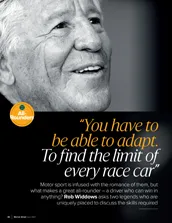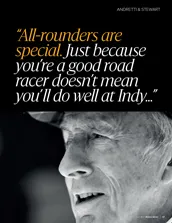As the season went on we were making some tremendous gains with the Lotus 77. We were gaining some downforce, but the big penalty was the car was like a brick in a straightline. Anywhere with a long straight we were in trouble that year. But we got a few results, and I had a good third in Canada. When we got to Fuji, it was just a matter of finishing the season on a high note. Everything was really leading to a good finish.
I always enjoyed Japan. It was a different sort of ambience there, the Japanese being all so very polite and very curious. I’d actually been to Fuji before, for an IndyCar race in 1966, but it was run in the reverse direction. Driving a circuit backwards is not the same at all – it’s like being in a different place entirely. With our straight-line problems I was surprised to get pole; had it then been a dry race as well, I’m not sure the outcome would have been the same. I think the rain was the equaliser on race day.
“I saw two Japanese drivers and thought, “Ah, they know where they’re going”
Conditions were unbelievable, and we only started after a long delay. The race is remembered today for the fact that the James Hunt/Niki Lauda battle had gone down to the wire. I think Lauda was 100 per cent correct to withdraw just after the start. It was one of the first races back from his accident, and to be fair I think it was reasonable to do it, even though it cost him so much. But that didn’t make the rest of us totally crazy by going ahead and accepting it, because it was the same for everyone.
Normally pole is good, especially in the wet, but I got smoked at the start, and Hunt got into the lead. There were rivers running across the track everywhere. Later I saw Jochen Mass and Vittorio Brambilla going by. I thought I’ll sit back and watch this… and before you knew it they were just hanging from the trees somewhere. There was just no way!





